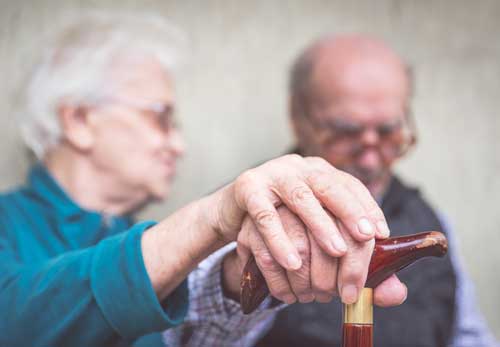Supporting Older and Vulnerable Clients Through the Pandemic
The first month of 2021 may have brought another lockdown, but this time, it is accompanied by the good news that the COVID-19 vaccine is being rolled out across the older and vulnerable population of Hertfordshire, safeguarding their health and well-being. However, we are seeing an increase in enquiries from members of this group and their families, for whom, the pandemic has prompted them to look again at how they can also safeguard their affairs and best interests. COVID-19 has brought a degree of uncertainty about the processes involved in doing this, but Longmores Older & Vulnerable team are still on hand to help, and it is perhaps now more than ever important to seek professional advice.
How can Longmores help older and vulnerable people?
Making a Will During the Pandemic
Over the first lockdown, there was a big shift in the number of people who put aside concerns of not having enough to leave, not having time, or being too young, and sought professional advice to make a Will. These concerns are common, but it is vital to make a Will if you have children whose futures you want to safeguard, if you want to control whom your legacy passes to, and how it is managed. With professional help, the process need not be difficult or time-consuming, and Wills can still be prepared and executed through the lockdown.
With older and vulnerable clients, taking legal professional advice is particularly important at this challenging time. If you have questions over whether the person making the will has capacity to do so, in the current climate, it will be harder to seek medical advice. However, the question in fact requires legal assessment, and we can advise you whether further assessment by a medical professional is necessary in your circumstances.
Additionally, it will be particularly important that precautions are taken for older and vulnerable people in preparing and witnessing their Wills. The involvement of a professional means that any issues which could raise questions about the validity of your Will, such as capacity, undue influence or fraud, are, if relevant, considered and dealt with. We are also able to advise on how the distribution of your estate could leave you open to claims.
Witnessing wills in the pandemic can cause issues for some and the safety of participants is particularly important where older and vulnerable people are concerned. Electronic signatures are not valid for Wills and witnessing wills via video link is still a new process, which brings greatly increased risks of challenge and abuse. Therefore, physically signing and witnessing is a requirement for most and we can advise on what form of socially-distanced witnessing will produce a validly executed Will, and the necessary precautions.
Lasting Powers of Attorney During the Pandemic
While many of the public surveyed by the Law Society made wills in the first lockdown, the vast majority did not make Lasting Powers of Attorney. Many people are unaware that you can only make choices about end-of-life provision yourself whilst you have mental capacity. Many of the same issues relating to preparing and witnessing Wills apply here, and again, we can advise on the sorts of socially distanced witnessing which will produce a legally valid Lasting Power of Attorney. We can also advise on what interim measures you can take to enable someone else, as far as possible, to act for you whilst your LPA is being registered. For example, in some circumstances, and where required, it may be possible to prepare a simpler, general power of attorney for the duration of that period.
Similarly, if you are an attorney or court-appointed deputy, the Office of the Public Guardian has confirmed that your role and responsibilities remain the same, and you are required to continue making decisions for the protected person, even if you are self-isolating or shielding. We can advise you on this, as well as assist you to disclaim your power if you become permanently unable to help and wish to step down.
Administering estates during the pandemic
Some of the processes involved in administering an estate have changed through the pandemic, although executors’ and administrators’ responsibilities remain the same. Should your family experience a bereavement, then we can advise on the revised processes and on issues such as electronic signatures and timescales.
Here to Help
Whilst the lockdown is ongoing, the office is closed, but we continue to work from our homes, and are available to speak with you in whichever way suits you best, via telephone, video conferencing or email. If you would like assistance with any of the issues raised above, please contact Victoria Wood.
Please note the contents of this article are given for information only and must not be relied upon. Legal advice should always be sought in relation to specific circumstances.

